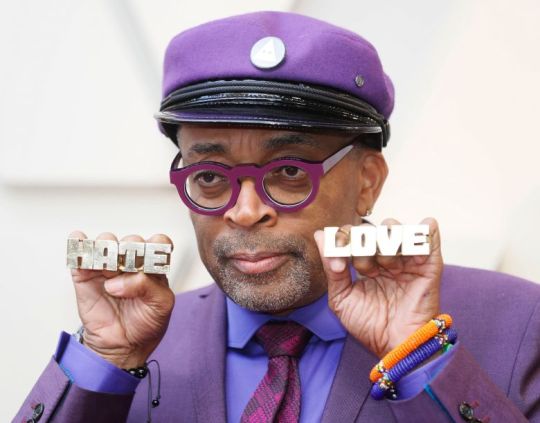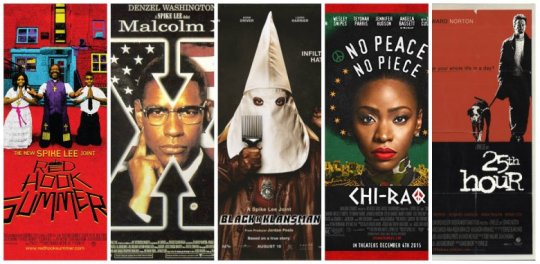#but ruth is specifically bad at smash bros
Text
Pete, Ruth and Richie: *Playing smash bros*
Ruth: *dies yet again*
Ruth: You guys are too good at this. This is abusement.
#my little sib said it#and i had to#starkid#nerdy prudes must die#but ruth is specifically bad at smash bros#i like to think ruth is bad at video games#also pete and richie#theyre all shit at video games but theyre fun#shes great at mario kart tho#richie lipschitz#incorrect quotes#peter spankoffski#pete spankoffski#source: my life#source: tumblr#hatchetfield#hatchetverse#tbh i just think shes most likely to say abusment
53 notes
·
View notes
Text
Spike Lee

Spike Lee is an African American director, producer, writer and actor. With over thirty-five films under his belt, which he refers to as “Spike Lee Joints”, Spike Lee has cemented his reputation as a director. Lee’s films often revolve around the black experience in America, which has been the basis of his films since his early career. He is known for making films that are controversial in nature, as well as being a controversial figure in general. He explores themes of race relations, colorism, poverty and other social issues.
Lee was born in Atlanta, Georgia in 1957 and moved to Brooklyn at a young age. His father was jazz composer William Lee and his mother Jacqueline Carroll, was a teacher of arts and black literature. Lee was aware of his African American identity from a very young age which would eventually become a big influence in his films. He went on to attend the all black Morehouse College where his father and grandfather both attended where he majored in communications. He found his passion for film at Morehouse and decided that he wanted to attend New York University for their graduate film program. Lee set out to make films that captured the black experience starting with his thesis film, Joe’s Bed-Stuy Barbershop: We Cut Heads. (Spike Lee Biography)

From early in his career to even his current films, Lee has always found difficulty in funding his films. His first feature film, She’s Gotta Have It, was shot with only $33,000 which wasn’t enough to get it through post-production. He screened a rough cut at NYU in order to get financial support. The final budget ended up being $175,000. (Rizov) For his biopic on the life of Malcom X, Warner Bros have him a $20 million budget which ended up going over budget by $13 million. Lee used $2 million of his own money as well as calling upon a group of black superstars to “bail him out”. This group included Oprah Winfrey, Janet Jackson, Bill Cosby and Prince. (Clark) Lee frequently attributes his struggle to find funding on race, claiming white directors get budgets in the hundreds of millions while he struggles to find a company to give him a $40 million budget. Lee is notably independent as a director, often writing directing and even starring in his own movies to any change in his vision for his films. (Rizov)

Lee is best known for creating films that deal with controversial issues including race relations, poverty, gang violence and police brutality. The film that cemented Lee’s status as a director was his 1989 film, Do The Right Thing, which dealt with all of these issues. Lee is quoted as saying, “the studios might not want to touch this film.” (Keeley) When Paramount Pictures asked him to tone down the climactic riot scene towards the end of the film, Lee took the film to Universal instead. (Rizov) Lee stated in his director’s notebook, “I know I’ll come up against some static from the white press. They’ll say I’m trying to incite a race riot. He turned out to be correct, critics said the film would result in violence amongst young African Americans and the film would ruin his reputation. Both of these accusations turned out to be wrong, and the exact opposite happened. (Keeley)
The film follows Mookie, a young black man played by Lee himself who lives in Bed-Stuy Brooklyn and works at Sal’s Famous, an Italian pizzeria. The majority of the film explores the race relations in a neighborhood where everyone knows everyone. The community is mainly African American with Italian Americans running the local pizzeria, a Korean couple owning the corner store, and a group of Hispanic people that live in the community. On the surface, the characters in the film all appear to coexist with few racial issues. As the film goes on, Lee explores some of the more nuanced racial tensions in the community. The most obvious is Sal’s son Pino, who from the start of the movie is consistently complaining to his father about working in a predominantly black community, using a fair share of racial slurs. Mookie, who has a child with Tina who is Puerto Rican expresses to her mother that he wants her son to speak English and it’s bad enough that his name is Hector. Radio Raheem becomes angry with the Korean couple when the accent barrier delays his purchase at their store, inciting him to yell at them to “speak proper English”.
The main conflict starts when Buggin’ Out complains to Sal that there are no black people on his Hall of Fame in the pizzeria. Sal explains that he is Italian American and only Italian Americans will go on the wall. Buggin’ Out spends the majority of the movie trying to organize a boycott against Sal’s which proves difficult since everyone in the neighborhood likes Sal and his pizza. As other minor conflicts arise and the racial tension builds, the movie cuts to a montage of characters of different races shouting a colorful array of racial slurs into the camera, finally ending with Samuel L. Jackson’s character “Love Daddy” telling them to “cool that shit out”.

Buggin’ Out finally gets two people to boycott Sal’s, Radio Raheem and Smiley who proceed to enter Sal’s blaring music saying they won’t eat there anymore. Tensions rise leading to Sal smashing the boombox with a bat and even dropping the n-word, resulting in a fight between Raheem and Sal. Police arrive, detaining Raheem and eventually choke him to death with a crowd of his peers begging the officer to stop. In the most climactic scene of the movie, Mookie throws a trash can through the window of the pizzeria inciting a riot that ends in Sal’s burning down. The mob crosses the street to presumably wreak havoc on the Korean couple’s shop where the Koreans shout that they caused no harm, and they are “black” just like the mob. As firefighters attempt to put out the fire and police attempt to control the mob, they chant the names of previous victims of police brutality. The next morning, there is a shot of the neighborhood with kids playing basketball and people walking around as if life had gone back to normal.
youtube
The story Lee captures in this film is one that is still seen today in America. The two main themes in this movie are race relations and police brutality which Lee captures both of in their most real form. Mookie acts as the bridge between the various racial groups that exist in the neighborhood, having a positive relation to every group. One of the most interesting parts about this movie is that there is no one that is painted as the true “villain”, every character has good qualities and flaws. In Sean Keeley’s analysis of the film he says, “no character is allowed to be Good or Bad; this is the crooked timber of humanity just waiting for a fuse.” (Keeley) The scenes of police brutality are ones that can still be seen played on news stations today. Lee says that Radio Raheem’s death was based on the murder of graffiti artist Michael Stewart. (Kilkenny) The film discussed highly controversial topics and was criticized heavily by the media at the time.
youtube

Another one of Spike Lee’s great works dealing with African American social issues is his biopic on Malcom X. The movie was released in 1992 following the death of Rodney King, who’s brutal police beating is shown in the opening sequence of the film, along with a burning American flag as Denzel Washington delivers one of Malcom X’s famous speeches. The film follows the life of Malcom, played by Washington, starting with his time as a gangster and hustler, known then as “Detroit Red”. There are frequent flashbacks to his childhood with his home being burned down by the Ku Klux Klan, his life in a foster home, and his mother trying to get justice for the death of his father.
When Malcom goes to jail the film begins to show the transformation from Detroit Red to Malcom X. Lee shows this through the dialogue but also through changes to his hair and facial hair as well as his attire. “Of particular note are the exceptional production values, from Ruth E Carter’s sumptuously detailed period costumes to Ernest Dickerson’s cinematography, which uses starkly different shades and tones to comment on each of the film’s three distinct segments.” (Clark) He is shown spending days in solitary confinement for refusing to state his inmate number then is introduced to the teachings of Elijah Muhammad. After finding out that the Nation of Islam has betrayed him and Elijah does not practice what he preaches, Malcom goes independent and travels to the Mecca for his pilgrimage. After arriving home and continuing to deliver speeches, he is threatened, attacked and eventually killed by his former allies.
This movie depicts the good and the bad about Malcom X. It depicts his early life as a gangster setting up robberies and doing cocaine with criminals then starkly transitions to his life as a Muslim once out of prison. While a greatly influential figure in the black community as a Muslim, Lee is also not afraid to include some of Malcom’s more controversial moments. This includes his views on women with banners stating, “We must protect our most valuable property: our women”. It also includes his infamous statement regarding the JFK assassination saying it was, “a case of chickens coming home to roost”. (Bose)
Spike Lee’s films have had a significant impact on the African American community and America as a whole. Whether his films are meant to provoke controversy, send a specific message or both, Lee’s movies are always created with the intent and purpose. From his breakout film Do The Right Thing which deals with race relations and police brutality to the more historically based biopic Malcom X, Lee creates his movies with the intent of delivering a message on behalf of the black community.
Works Cited
Bose, Swapnil Dhruv. “‘By Any Means Necessary’: The Importance of Spike Lee Film 'Malcolm X'.” Far Out Magazine, 18 Nov. 2020, faroutmagazine.co.uk/by-any-means-necessary-the-importance-of-spike-lee-film-malcolm-x/.
Clark, Ashley. “Malcolm X: Spike Lee's Biopic Is Still Absolutely Necessary.” The Guardian, Guardian News and Media, 19 Feb. 2015, www.theguardian.com/us-news/2015/feb/19/malcolm-x-spike-lee-biopic-black-cinema-selma-the-butler.
Keeley, Sean. “The Radical Empathy of Do the Right Thing.” American Interest, vol. 16, no. 1, Sept. 2020, pp. 1–9. EBSCOhost, search.ebscohost.com.libserv-prd.bridgew.edu/login.aspx?direct=true&db=a9h&AN=145917906&site=ehost-live.
Kilkenny, Katie. “Spike Lee Reflects on Police Brutality Since 'Do the Right Thing' on 'Tonight Show'.” The Hollywood Reporter, The Hollywood Reporter, 9 June 2020, www.hollywoodreporter.com/news/general-news/spike-lee-reflects-police-brutality-do-right-thing-1297644/.
Palis, Eleni. “The Economics and Politics of Auteurism: Spike Lee and Do The Right Thing.” Cinema Journal, vol. 57, no. 2, Winter 2018, pp. 1–21. EBSCOhost, doi:10.1353/cj.2018.0000.
Rizov, Vadim. “Joint Financing: Spike Lee Has Never Had an Easy Time Funding His Films.” MTV News, 26 July 2013, www.mtv.com/news/2770944/spike-lee-film-funding/.
“Spike Lee Biography.” Encyclopedia of World Biography, www.notablebiographies.com/Ki-Lo/Lee-Spike.html.
0 notes